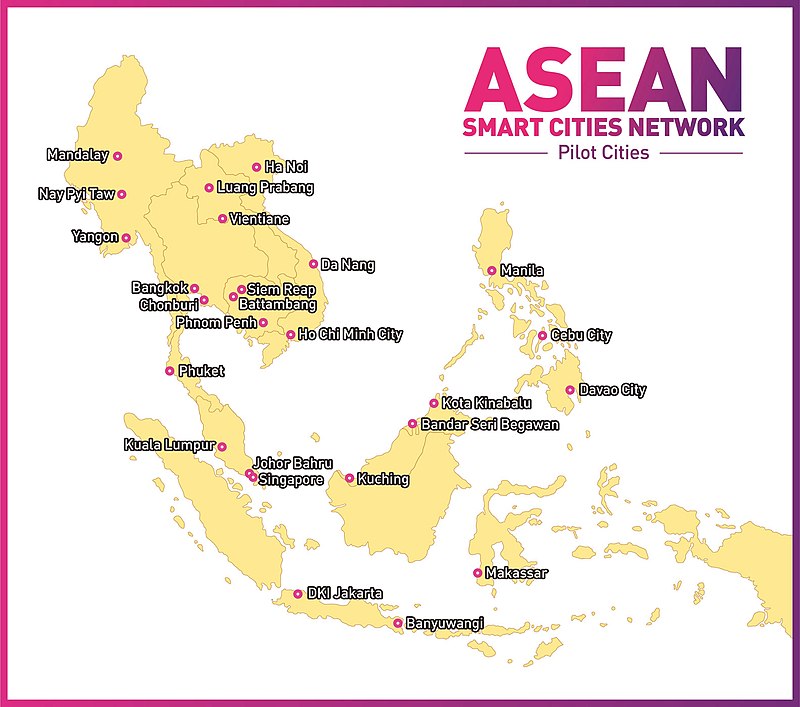The ASEAN Smart Cities Network (ASCN) is a collaborative platform that aims to unify smart city development efforts across ASEAN. The ACSN aims to facilitate cooperation on smart city development, broker smart city development projects between city government units and local private sector firms, and secure funding and support for these developments from ASEAN's external partners.[1] The initiative was launched at the 32nd ASEAN Summit as a key deliverable of Singapore's ASEAN Chairmanship in 2018,[2] and its Inaugural Meeting took place on 8 July 2018.
Background
The ASCN was formed as a response to rapid urbanization throughout Southeast Asia, and aims to standardize the ongoing or upcoming developments of various metropolitan areas in the region.
Southeast Asia's growth has primarily been driven by metropolises, and an estimated 90 million people are expected to enter the region's metropolitan areas by 2030. "Middleweight cities" with populations between 200,000 and 2 million residents are expected to drive 40% of the region's urban development growth, and the ASCN aims to help ASEAN Member States plan and enact initiatives that wish to bring more cities up to the metropolitan level.[1]
ASCN Cities
A list of the 26 Pilot Cities that have been nominated by the respective ASEAN Member States is as follows:

 Brunei- Bandar Seri Begawan
Brunei- Bandar Seri Begawan Cambodia- Battambang
Cambodia- Battambang Cambodia- Phnom Penh
Cambodia- Phnom Penh Cambodia- Siem Reap
Cambodia- Siem Reap Indonesia- Makassar
Indonesia- Makassar Indonesia- Banyuwangi
Indonesia- Banyuwangi Indonesia- Jakarta
Indonesia- Jakarta Laos- Luang Prabang
Laos- Luang Prabang Laos- Vientiane
Laos- Vientiane Malaysia- Johor Bahru
Malaysia- Johor Bahru Malaysia- Kuala Lumpur
Malaysia- Kuala Lumpur Malaysia- Kota Kinabalu
Malaysia- Kota Kinabalu Malaysia- Kuching
Malaysia- Kuching Myanmar- Naypyidaw
Myanmar- Naypyidaw Myanmar- Mandalay
Myanmar- Mandalay Myanmar- Yangon
Myanmar- Yangon Philippines- Cebu City
Philippines- Cebu City Philippines- Davao City
Philippines- Davao City Philippines- Manila
Philippines- Manila Singapore- Singapore
Singapore- Singapore Thailand- Bangkok
Thailand- Bangkok Thailand- Chonburi
Thailand- Chonburi Thailand- Phuket
Thailand- Phuket Vietnam- Da Nang
Vietnam- Da Nang Vietnam- Hanoi
Vietnam- Hanoi Vietnam- Ho Chi Minh City
Vietnam- Ho Chi Minh City
The Smart City Action Plans and Priority Projects developed by the 26 Pilot Cities can be found here
Representation
Each ASEAN Member State nominates a National Representative to the Network.[1] In addition, each city also nominates a Chief Smart City Officer (CSCO).[1] The status of a CSCO is equivalent to that of a Chief Urban Planner or Chief Resilience Officer.[3] CSCO's role is to attend the annual meeting, craft his or her respective city’s action plan and discuss the ASEAN Smart Cities Framework. There is thus representation at both the national and municipal levels. The table below lists the CSCOs who are each city's main point of contact with the Network.
| City | Chief Smart City Officer | Designation |
|---|---|---|
| Bandar Seri Begawan | Haji Ali Matyassin | Chairman, Bandar Seri Begawan Municipal Department |
| Battambang | Soeum Bunrith | Deputy Governor, Battambang Province |
| Phnom Penh | NUON Pharat | Deputy Governor, Phnom Penh Capital City |
| Siem Reap | Ly Samreth | Deputy Governor, Siem Reap Province |
| Makassar | Ismail Hajiali | Head of Communications and Information, Makassar City Government |
| Banyuwangi | Budi Santoso | Head of Informatics, Communications and Encryption, Banyuwangi Government |
| DKI Jakarta | Dian Ekowati | Head of Communications and Informatics Office |
| Luang Prabang | Soukan Bounnyong | Mayor |
| Vientiane | Bouchan Keosithamma | Deputy Director of Public Works and Transport, Vientiane Capital |
| Johor Bahru | Maimunah Jaffar | Head, Planning and Compliance |
| Kuala Lumpur | Datuk Najib bin Mohamad | Executive Director (Planning) |
| Kota Kinabalu | Stanley Chong Hon Chung Tantinny Fung Chew Li | Director of City Planning Department, Dewan Bandaraya Kota Kinabalu Town Planner, City Planning Department, Dewan Bandaraya Kota Kinabalu |
| Kuching | Julin Alen | Principal Assistant Director, State Planning Unit, Chief Minister Department, Sarawak |
| Nay Pyi Taw | Myo Aung | Permanent Secretary, Nay Pyi Taw Development Committee |
| Mandalay | Ye Myat Thu | Committee Member, Mandalay City Government |
| Yangon | Tin Tin Kyi | Director of Urban Planning Division Representative, Yangon City Development Committee |
| Cebu City | Nigel Paul C. Villarete | City Administrator |
| Davao City | Mgen Benito Antonio T De Leon Afp Rowena Henedine Dominguez-Narajos | Head Public Safety and Security Command Center Information Technology Officer II |
| Manila | Mario Zapatos Oblefias | Head, Electronic Data Processing, Manila City Hall |
| Singapore | Tan Chee Hau | Director(Planning and Prioritization) Smart Nation and Digital Government Office, Prime Minister's Office |
| Bangkok | Chaiwat Thongkamkoon | Director-General, Office of Transport and Traffic Policy and Planning |
| Chonburi | Seksan Phunboonmee | Policy and Plan Analyst, Energy Policy and Planning Office, Ministry of Energy |
| Phuket | Passakon Prathombutr | Senior Executive Vice President, Digital Economy Promotion Agency |
| Da Nang | Nguyen Quang Thanh | Director, Da Nang Department of Information and Communication |
| Hanoi | Nguyen Duc Chung | Chairman, Hanoi People's Committee |
| Ho Chi Minh City | Tran Vinh Tuyen | Vice Chairman, Ho Chi Minh City People's Committee |
Support and partnerships

In March 2018, Australia announced a A$30 million fund to support smart city development in ASEAN.[4]
In July 2018, five agreements were signed during the Opening Ceremony of the Inaugural ASCN Meeting.[5] Among them was an agreement between the United Nations Development Program (UNDP) and the Japan External Trade Organization (JETRO) which expressed support for the ASCN in the context of promoting sustainable development in the Asia Pacific.[6] An agreement was also signed between the Amata Smart City Corporation Chonburi and the Yokohama Urban Solutions Alliance.[5]









